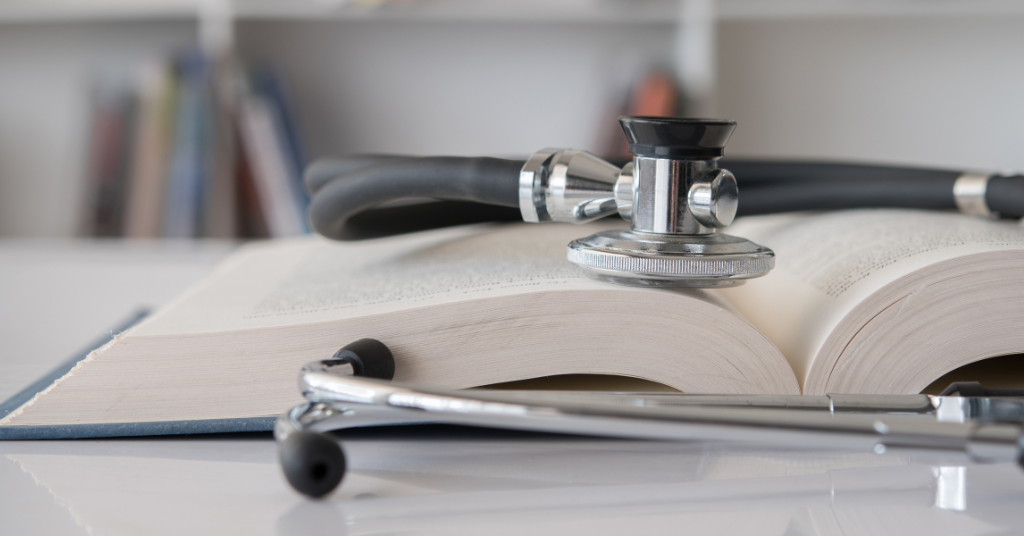A study debunks how hearing works
January 2, 2023
Roger SoundField makes school more effective
January 9, 2023Accommodations in Medical School

A research study led by Lisa M. Meeks at the University of Michigan sheds light on accommodation requests reported by a national sample of U.S. medical students. Abigail Russell describes these findings, shares her experience as a deaf medical student, and offers advocacy tips.
The Assessment
The study — which collected data from 2019-2020 — used second-year surveys of the Association of American Medical Colleges (AAMC) Year Two Questionnaires. AAMC works to improve academic medical education by collaborating with medical schools nationally. The assessment/study revealed three key findings.
- Of the 27,009 students who completed the survey, 9.0% disclosed they had a disability. This study broke down disabilities into three cohorts: chronic health, cognitive, and motor/sensory disabilities. Cognitive disabilities included ADHD, learning, psychological, or other disability. The motor/sensory category was broken down into deaf/hard of hearing, mobility, visual, and other disability.
- Out of the 27,009, 56 individuals marked themselves as being deaf or hard of hearing. One limitation of this study is that we can’t see how many of the deaf or hard of hearing students received accommodations.
- One in 5 medical students did not request accommodations, out of the total number that reported needing accommodations. This is concerning because having a disability without utilizing appropriate accommodations can lead to depressive thoughts and mistakes in the workplace. The question is, why did 20% of students not access the accommodations? Was it based on personal experiences, or was the school not properly prepared for the student?
Navigating Accommodations in Medical School: Personal Experience
I would not be one of the five that did not request accommodations. Upon acceptance into medical school in 2021, I quickly found out that my school hasn’t needed to accommodate someone who has severe hearing loss like myself. I utilize a cochlear implant and a Phonak Naída™ Paradise hearing aid. Thankfully, Indiana University School of Medicine let me know that they are willing to learn and provide me the best education possible. Being the first oral deaf student in an education system wasn’t new for me. I was also the first oral deaf student in my elementary, high school, and university. What I’ve found is that both the student and the educators need to be flexible.
Medical school is a different dynamic than undergraduate. Changes in accommodations tend to be made day by day. The coursework is completed at a much faster rate. The professors you have change constantly. There isn’t really a quick and easy way to teach everyone about the microphone system (RogerOn) and CART (real time captioning service).
Hurdles Faced in Medical School With Hearing Loss
Masks
On my first day of orientation, masks were immediately handed out as the mask mandate was in effect due to COVID-19. Even though I understood, it made getting to know my peers so much more difficult. With masks plus the background noise of everyone’s voices, I could not hear my peers. The stress of beginning medical school plus sharing to my peers about my hearing loss was overwhelming the first few weeks. No one wants to disclose their disability before their classmates get to know who they are as a whole person. However, with masks, live captioning, and my microphone system, my classmates found out early on.
Group Work
Our curriculum has case-based learning within a small group. The microphone is my lifeline, so I can hear what my peers say. Even now, without the masks, background noise can wash out their voices. This leads to more intensive lip reading and having listening fatigue.
The variety of speakers that come in enhance our perspective in medical education. However, it can be difficult to teach each speaker about my RogerOn mic and CART. The mic needs to be held or placed in a certain distance. It also needs to be returned to me after they speak so that I can hear my small group’s discussion. It is a lot of back and forth. We all need to be patient with one another.
Equipment and Technology
I use a special stethoscope that I appreciate. I’m so thankful to have a piece of technology that connects via Bluetooth to my hearing aid so that I can listen to someone’s heart, lungs, and so forth. This is a recent innovation that gives me more autonomy. When I see my patients in clinic, I always explain to them how my special stethoscope functions because I don’t put the earpieces in my ear. The patients I’ve had have been so understanding. They have been excited with me!
Every day has been a learning experience, for me, my classmates, professors, and the school. Not every day has been easy or without discrimination. But I’ve been encouraged by the individuals who fight alongside with me to make sure I get what I need. There are several people who I credit for believing in me. They have constantly worked with me to learn what accommodations are needed.
A Note to Those Who are Deaf or Have Hearing Loss in Higher Education
I know just how hard it is to put yourself out there. Walking up to the front of the class to hand the professor the microphone causes classmates to be curious. When captioning is presented on the screen, you may cringe inside as everyone knows why and for whom the captioning is on the screen. The professor with good intentions may ask you in front of the whole class, “Can you hear everything okay?” For some lectures that are online via Zoom, we’ve had to navigate how to not disclose my hearing loss in front of the class when trying to make sure captioning is working. Trust me, I get it. I’ve been there, and I’m there now. As I am in my second year of medical school, I feel the need to encourage you. Know you are not alone. Know you are so incredibly able to reach your dreams.
One way I’ve always found the courage inside of me is to recognize that I’m not only advocating for myself, but I am also advocating for those who come next. While I’ve usually been the only student with hearing loss who utilizes this kind of technology in my school, I’ve learned that I am never the last.
I’m not only advocating for myself, but I am also advocating for those who come next.
One piece of advice I never forgot is this: “You are leveling the playing field.” There is so much truth in this statement. When you enter higher education, you begin to make choices in how much you decide to make your hearing loss needs known and whether you will utilize accommodations. I’m here to encourage you to use the accommodations that you need to get the best education you deserve.
Ways to Level That Playing Field
There are numerous ways to level that playing field. AG Bell’s Higher Education webpage dives into some applicable resources. This was designed by the Higher Education Task Force, a group of oral deaf and hard of hearing individuals who are either currently in college or recent graduates.
Some resources that you can find on AG Bell’s webpage include:
- Checklists that help guide conversations between the students, professors, and disability resources office
- Advice for college prep, such as meeting with the Disability Office to make sure you are set up before classes begin
- Personal experiences of previous college students who are oral deaf and hard of hearing
- Examples of equipment that could be useful in the classroom, as well as some tips of technology useful for living in a dormitory/apartment.
- Examples of a variety of accommodations
- Scholarship and Internship opportunities
Read more: 5 ways deaf students can advocate for themselves in college
Ways to Advocate for Your Needs
- Communication is a team effort. Email your professors ahead of time, then plan to meet them before classes begin. This will help establish good communication and help the professor be familiar with the technology and the accommodations requested. Remember, it’s usually not just new for you, but it is also may also be new for the professor. Communication is vital.
- Your accommodations may need tweaking and that is okay. Can’t hear well, even with accommodations? Meet with the professor and create a new game plan. There is not a one size fits all strategy that works for all persons with hearing loss. Sometimes you may need to try different things.
- Know your rights – the value of the American Disabilities Act. Unfortunately, sometimes students with hearing loss may run into scenarios where they may need to look to the ADA, or the American Disabilities Act. This law was formed in 1990 to protect individuals with disabilities against discrimination.
Always remember, you’ve got this, and you are not alone. There is so much to look forward to!



